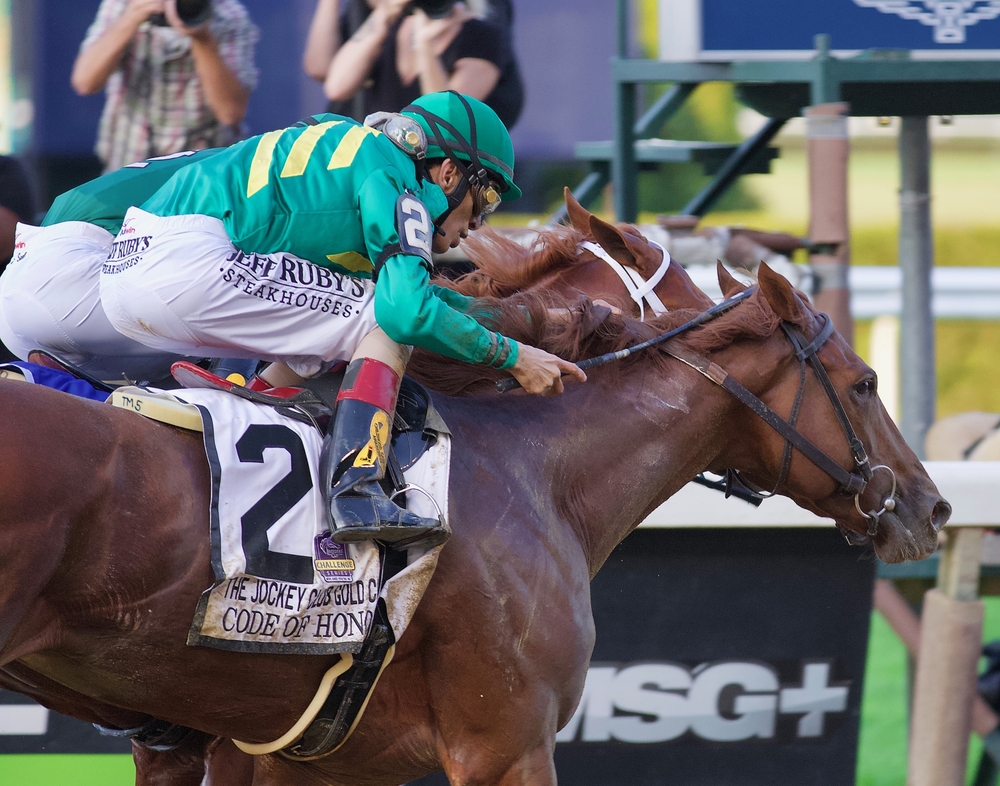The short answer to the question whether “are all race horses male?” is no. Horse races around the world feature a mix of male and female horses, with some being all-male, some all-female, and some open to both sexes.
One thing you need to understand about horse racing is that people that own horses aren’t just interested in winning races. They’re also interested in the breeding of horses, as this can be a very lucrative business.
Why More Race Horses Are Male
The holy grail of horse racing for lots of owners is to find a wonder colt, a well-bred male entire that will win big races like the classics and retire to become the most sought-after stallion on the planet. That’s why more racehorses tend to be male.
The best recent example of a wonder colt is Frankel, who won all 14 of his races including an explosive display in the 2,000 Guineas. He won prize money totalling just under £3 Million in a racing career that lasted three years before he retired to stud.
As the top-rated horse in the world, himself out of the top-rated stallion in the world Galileo, Frankel’s stud fee for impregnating a filly or mare was always going to be an expensive one. Frankel now resides at his owner’s Juddmonte Stud Farm and commands a stud fee of £175,000. That’s why the world of breeding racehorses is much more lucrative than winning horse races.
But owning a high-class filly or mare can also be very lucrative. It may cost £175,000 to get your filly or mare impregnated by Frankel, but his yearlings have averagely sold for £436,00, with Frankel’s highest-priced yearling fetching an amazing £3.1 Million.
Having said that, as horses normally only carry one foal a year, it’s easy to see why a top-class colt that can cover over 100 horses each season is a far more exciting prospect for breeders that having a high-class broodmare.
But the fact it takes horses of both sexes to make a foal is another reason why the answer is no to the question, are all race horses male? There will always be the need to breed high-class colts and fillies, which is why flat racing has a designated program to encourage owners and breeders to race both colts and fillies.
Races Used to Showcase Colts & Fillies
Flat Racing has a program designed to find the best colts and fillies when they are aged two and three, and many winners of these races will go onto to be important players in the breeding industry.
Races such as the Coventry Stakes at Royal Ascot, the Dewhurst Stakes at Newmarket, and the Vertem Futurity Stakes at Doncaster are often won by colts that will challenge for the Classics as 3-year-olds. Classics for colts in the United Kingdom include the 2,000 Guineas, the Derby, and the St Leger.
Big 2-year-old races for fillies include the Queen Mary at Royal Ascot and the Rockfel Stakes at Newmarket. Fillies then have a bigger choice of classics that the colts, as they can also run in the 2,000 Guineas and Derby, but most run in 1,000 Guineas and the Oaks, which are female-only classics.
The best of both sexes often clash in the St Leger, but only User Friendly and Simple Verse have lifted the trophy for the fairer sex since 1986.
Equality in Horse Racing
The battle for sexual equality in all walks of life may continue, but horse racing is a uniquely wonderful sport were men and women can regularly compete against each other, be it as owners, trainers, or jockeys.
There are also lots of opportunities for the top-class fillies to compete against the top-class colts, especially as racing’s governing body gives them a weight-allowance to do so. Since the start of this century, the racing world has also been lucky to witness some of the best fillies and mares ever to have graced the racetrack.
Some wonderful fillies have won the Prix de l’Arc de Triomphe in recent years. Zarkava, Danedream, and Solemia all notched up wins before the brilliant Treve won Europe’s richest race twice in 2013 and 2014. Found then won it before the brilliant Enable also won it twice.
Australia is another country that has produced wonder females in recent times. The first of these was the sprinter Black Caviar who remained unbeaten in a 25-race career that included 15 Group 1 victories. Many thought that record would never be beaten, but then along came the wonderful Winx who managed to win 33 races on the bounce including 25 Group 1 victories. No mean feat when you think Frankel raced just 14 times in three seasons.
Fillies and Mares in National Hunting
Breeding is still an important part of National Hunt Racing, but less so than in Flat Racing. That’s because most male national hunt horses have been gelded and have no future as stallions, meaning owners are encouraged to race them for longer.
Fillies and mares that take part in National Hunt Racing can have a future as broodmares, but allowances in big races again mean a top-class female can also enjoy rich picking over jumps. Annie Power and Epatante have shown mares can have what it takes to beat the boys with victories in the Champion Hurdle in the last five years, whilst Honeysuckle won the 2020 Irish Champion Hurdle.
Despite those successes against the boys, horse racing has also recognised the public has really taken to mares in recent years and enjoy watching them race against other mares. Let’s face it, the girls rarely take on the boys in other professional sports such as athletics, tennis, or football.
Horse racing really should be applauded for its diversity, as it gives female horses the best of both worlds. Not only can they race against their own sex in female-only races but, if good enough, they can also take on and beat the boys in many of the prestigious Championship races.
So, Are All Race Horses Male?
So, the answer may be no to the question, are all race horses male? But, hopefully, you now have a much deeper understanding of why race horses are both male and female.
Can female horses race?
Absolutely, female horses, known as mares, can and do participate in horse racing. Horse racing includes events for both male and female horses. Various races are designed exclusively for females, while others are open to mixed gender competition. In fact, many of the most prestigious races around the world, such as the Kentucky Oaks in the United States or the Epsom Oaks in the UK, are specifically for fillies (young female horses).
In these races, female horses showcase their speed, endurance, and racing prowess just like their male counterparts. The performance and achievements of mares in horse racing are highly respected, and they often become beloved figures in the sport, winning fans and accolades based on their talents and racing accomplishments.
What does gelded mean in horse racing?
In the realm of horse racing, the term “gelded” refers to a male horse that has undergone a surgical procedure called castration. Castration involves the removal of the testicles, which are the primary source of testosterone in male horses. As a result, gelded horses are deprived of their ability to reproduce and typically experience a reduction in hormonal-driven behaviors such as aggression and excessive distraction.
Gelding is commonly carried out for a variety of reasons. In horse racing, gelding is often performed to modify a horse’s temperament and behaviour, making them more focused, manageable, and calmer. This alteration can enhance their ability to concentrate on racing and training, making them potentially more competitive on the track. Geldings are popular choices for racing due to their altered behaviour and the absence of breeding-related complications, which can be beneficial for both racing performance and overall horse management.
Why do race horses have weird names?
Race horses often sport unconventional names due to a blend of tradition, regulations, and the desire for distinction. Naming regulations set by racing authorities, like The Jockey Club in the UK, help maintain order and prevent offensive or inappropriate names. These regulations often lead to inventive combinations of words, numbers, or references that give rise to unique names.
Owners and breeders often seek names that stand out and resonate, making their horses memorable. Quirky or unusual names can capture attention, generate buzz, and set a horse apart in a crowded field. Some names carry personal meaning to owners, or they might reflect the horse’s lineage, personality, or physical traits. Ultimately, the blend of creativity, rules, and the pursuit of individuality contributes to the diverse and occasionally odd names that grace the world of horse racing.





